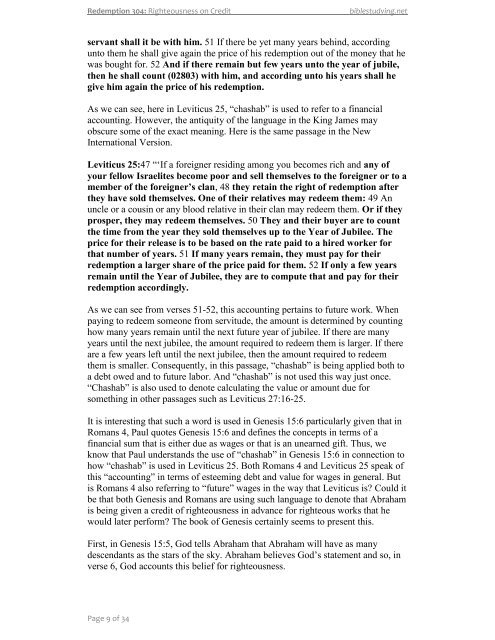righteousness-credit
righteousness-credit
righteousness-credit
Create successful ePaper yourself
Turn your PDF publications into a flip-book with our unique Google optimized e-Paper software.
Redemption 304: Righteousness on Credit<br />
biblestudying.net<br />
servant shall it be with him. 51 If there be yet many years behind, according<br />
unto them he shall give again the price of his redemption out of the money that he<br />
was bought for. 52 And if there remain but few years unto the year of jubile,<br />
then he shall count (02803) with him, and according unto his years shall he<br />
give him again the price of his redemption.<br />
As we can see, here in Leviticus 25, “chashab” is used to refer to a financial<br />
accounting. However, the antiquity of the language in the King James may<br />
obscure some of the exact meaning. Here is the same passage in the New<br />
International Version.<br />
Leviticus 25:47 “‘If a foreigner residing among you becomes rich and any of<br />
your fellow Israelites become poor and sell themselves to the foreigner or to a<br />
member of the foreigner’s clan, 48 they retain the right of redemption after<br />
they have sold themselves. One of their relatives may redeem them: 49 An<br />
uncle or a cousin or any blood relative in their clan may redeem them. Or if they<br />
prosper, they may redeem themselves. 50 They and their buyer are to count<br />
the time from the year they sold themselves up to the Year of Jubilee. The<br />
price for their release is to be based on the rate paid to a hired worker for<br />
that number of years. 51 If many years remain, they must pay for their<br />
redemption a larger share of the price paid for them. 52 If only a few years<br />
remain until the Year of Jubilee, they are to compute that and pay for their<br />
redemption accordingly.<br />
As we can see from verses 51-52, this accounting pertains to future work. When<br />
paying to redeem someone from servitude, the amount is determined by counting<br />
how many years remain until the next future year of jubilee. If there are many<br />
years until the next jubilee, the amount required to redeem them is larger. If there<br />
are a few years left until the next jubilee, then the amount required to redeem<br />
them is smaller. Consequently, in this passage, “chashab” is being applied both to<br />
a debt owed and to future labor. And “chashab” is not used this way just once.<br />
“Chashab” is also used to denote calculating the value or amount due for<br />
something in other passages such as Leviticus 27:16-25.<br />
It is interesting that such a word is used in Genesis 15:6 particularly given that in<br />
Romans 4, Paul quotes Genesis 15:6 and defines the concepts in terms of a<br />
financial sum that is either due as wages or that is an unearned gift. Thus, we<br />
know that Paul understands the use of “chashab” in Genesis 15:6 in connection to<br />
how “chashab” is used in Leviticus 25. Both Romans 4 and Leviticus 25 speak of<br />
this “accounting” in terms of esteeming debt and value for wages in general. But<br />
is Romans 4 also referring to “future” wages in the way that Leviticus is? Could it<br />
be that both Genesis and Romans are using such language to denote that Abraham<br />
is being given a <strong>credit</strong> of <strong>righteousness</strong> in advance for righteous works that he<br />
would later perform? The book of Genesis certainly seems to present this.<br />
First, in Genesis 15:5, God tells Abraham that Abraham will have as many<br />
descendants as the stars of the sky. Abraham believes God’s statement and so, in<br />
verse 6, God accounts this belief for <strong>righteousness</strong>.<br />
Page 9 of 34


